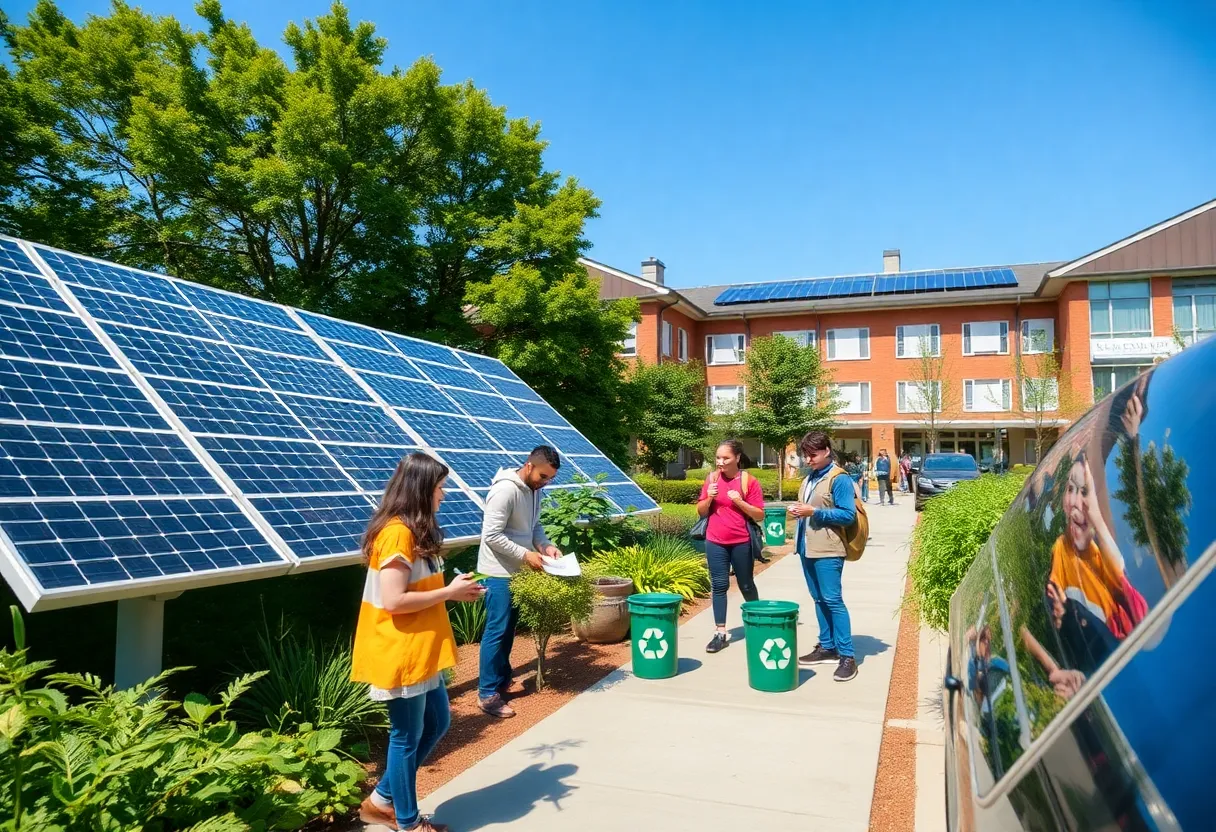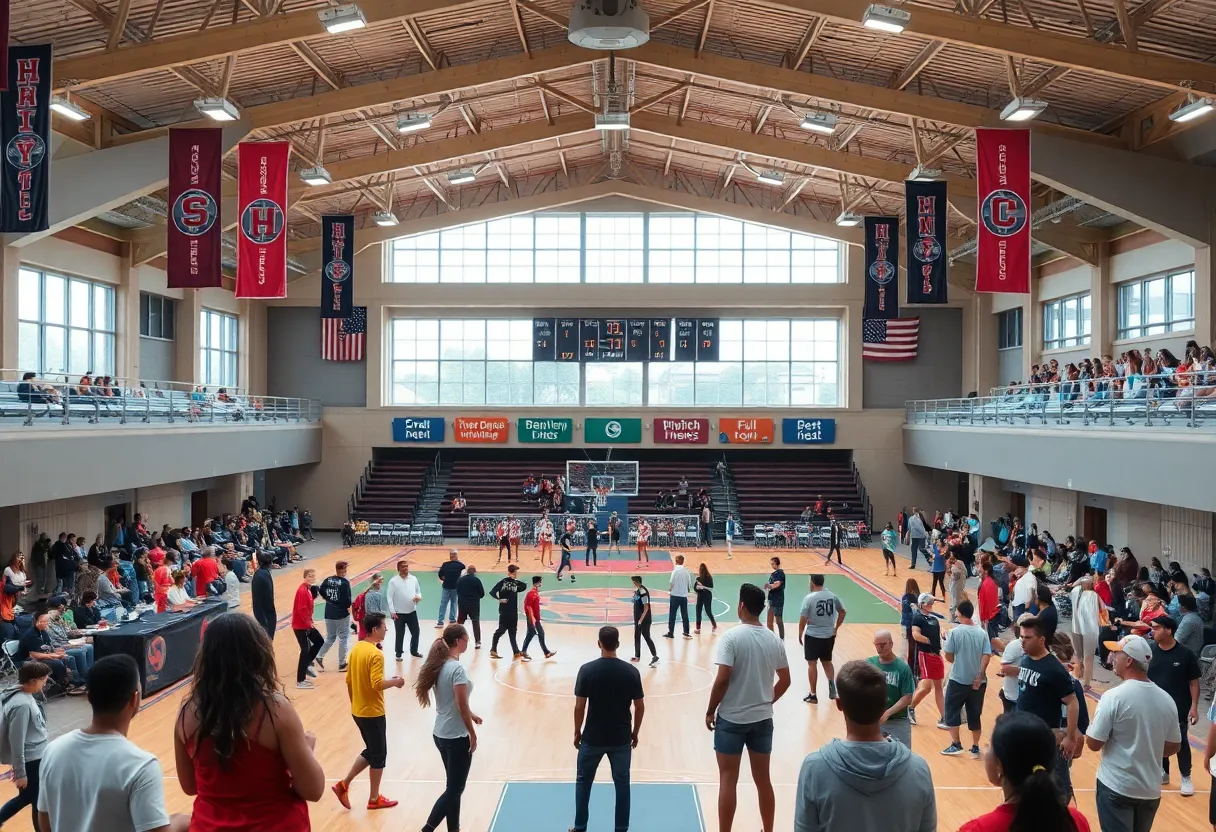Edmond, October 16, 2025
The University of Central Oklahoma in Edmond has launched an ambitious sustainability initiative aimed at achieving campus-wide zero-waste goals by 2030. The initiative features solar panels, composting programs, and recycling drives, supported by a $2 million budget. With community engagement and partnerships with local environmental organizations, UCO is set to significantly reduce its carbon footprint and influence sustainability practices in higher education across the region.
Edmond, OK – University of Central Oklahoma Unveils Ambitious Sustainability Initiative
The University of Central Oklahoma in Edmond has launched a comprehensive sustainability initiative aimed at achieving campus-wide zero-waste goals by 2030. Announced on October 16, 2025, the plan represents a significant step toward environmental responsibility, integrating various green practices across the university’s operations. This move positions the institution as a leader in sustainable higher education within Oklahoma.
At the core of the initiative are practical measures designed to reduce waste and promote renewable resources. Key components include the installation of solar panels on campus buildings to generate clean energy, the establishment of composting programs to manage organic waste, and student-led recycling drives to encourage participation from the entire community. These efforts will be supported by rainwater harvesting systems for campus facilities, helping to conserve water and lower utility costs. Engineering and environmental science students will take on pivotal roles in developing and implementing these green technologies, fostering hands-on learning opportunities.
To ensure measurable progress, the university has formed partnerships with local environmental organizations. These collaborations will utilize data analytics to track improvements in waste reduction and energy efficiency. The initiative’s funding comes from a $2 million budget, drawn from state grants and contributions from alumni. This financial backing will cover the initial setup and ongoing maintenance of the projects, ensuring long-term viability.
Beyond campus boundaries, the program includes community outreach to extend its impact. Scheduled workshops on eco-friendly living will engage residents of the Oklahoma City area, providing education on sustainable practices that can be applied at home. Early responses from faculty and students have been positive, with many expressing interest in volunteering for pilot projects. This enthusiasm suggests strong internal support for the goals, which could accelerate implementation.
Alignment with Broader Trends
The University of Central Oklahoma’s initiative aligns with growing national trends in higher education toward proactive climate action. Many universities across the country are adopting similar strategies to address environmental challenges, such as reducing carbon emissions and promoting circular economies. By focusing on zero-waste, UCO joins this movement, potentially influencing other institutions in Oklahoma to follow suit.
Projected long-term benefits include a substantial decrease in the university’s environmental footprint. Estimates suggest the plan could reduce the campus’s carbon footprint by 40% through combined efforts in energy production, waste management, and water conservation. Such reductions not only benefit the environment but also enhance the university’s reputation as a forward-thinking educational hub.
Implementation and Community Involvement
Implementation will begin with pilot projects to test the effectiveness of composting and recycling drives. Student volunteers will lead these efforts, gaining practical experience while contributing to real-world sustainability solutions. The solar panel installations and rainwater systems are expected to roll out in phases, starting with high-traffic areas like academic buildings and dormitories.
Local partnerships will provide expertise in monitoring and reporting, ensuring transparency in progress updates. Community events will serve as platforms for broader education, covering topics from reducing single-use plastics to energy-efficient habits. This inclusive approach aims to build a culture of sustainability that extends beyond the university gates, benefiting the wider Oklahoma City region.
The initiative’s success will depend on sustained commitment from all stakeholders. With a clear timeline to 2030, regular assessments will adjust strategies as needed. Faculty feedback highlights the educational value, as courses in environmental science and engineering will incorporate these projects. Students anticipate gaining skills that prepare them for careers in green industries, further amplifying the initiative’s reach.
As Oklahoma institutions increasingly prioritize sustainability, the University of Central Oklahoma’s plan sets a benchmark. It demonstrates how universities can integrate environmental goals with academic and community missions, fostering a healthier planet for future generations. The zero-waste target, combined with innovative technologies, underscores a practical path to meaningful change.
Potential Challenges and Opportunities
While the plan faces logistical hurdles, such as coordinating large-scale installations, the allocated budget and partnerships mitigate these risks. Opportunities for innovation abound, particularly through student involvement, which could lead to original solutions tailored to the campus. Overall, the initiative promises to transform daily operations into models of efficiency and care for the environment.
FAQ
What is the main goal of the University of Central Oklahoma’s sustainability initiative?
The main goal is campus-wide zero-waste goals by 2030.
When was the sustainability initiative announced?
The initiative was unveiled on October 16, 2025.
What are the key components of the plan?
The key components include solar panel installations, composting programs, and student-led recycling drives.
How will progress be monitored?
Progress will be monitored through data analytics via partnerships with local environmental organizations.
What is the funding source for the initiative?
The funding comes from a $2 million budget sourced from state grants and alumni donations.
Who will play key roles in implementing the technologies?
Engineering and environmental science students will play key roles in implementing green technologies, such as rainwater harvesting systems for campus buildings.
What community engagement activities are planned?
Community events, including workshops on eco-friendly living, are scheduled to engage the broader Oklahoma City area.
What is the projected long-term impact?
The long-term impacts could reduce the university’s carbon footprint by 40%.
Key Features of the Sustainability Initiative
| Feature | Description | Timeline/Impact |
|---|---|---|
| Solar Panel Installations | Installation of solar panels on campus buildings to generate clean energy | Phased rollout by 2030; contributes to carbon footprint reduction |
| Composting Programs | Establishment of programs to manage organic waste | Immediate pilot projects; supports zero-waste goals |
| Student-Led Recycling Drives | Drives organized by students to boost recycling participation | Ongoing from 2025; engages campus community |
| Rainwater Harvesting Systems | Systems for campus buildings to conserve water | Implemented by engineering students; reduces water usage |
| Data Analytics Monitoring | Partnerships with local organizations for progress tracking | Continuous monitoring; ensures measurable outcomes |
| Community Workshops | Eco-friendly living workshops for Oklahoma City area | Scheduled events starting 2025; broadens impact |
| Budget Allocation | $2 million from state grants and alumni donations | Funds all efforts; enables long-term sustainability |
| Carbon Footprint Reduction | Overall environmental impact goal | 40% reduction by 2030 |
Deeper Dive: News & Info About This Topic
HERE Resources
Firefly Brew Opens Oklahoma’s First Kombucha Brewery in Tulsa
Oklahoma City Hosts Free Community Suit Giveaway
Oklahoma State Fair Concludes with Economic Impact
Philanthropist Donald George Passes Away at 78, Leaving Impact on Oklahoma’s Retail Sector
Competitive Field Emerges for House District 45 Special Election
Oklahoma City University Launches Renewable Energy Research Center
Devon Energy Center Recognized as the Coolest Building in Oklahoma
Putnam City Schools Opens Centennial Center and Park
Oklahoma City Celebrates New Pedestrian Bridge and FAM Landing
Oklahoma State University’s Business Incubator Launches $5 Million Agrotech Fund





